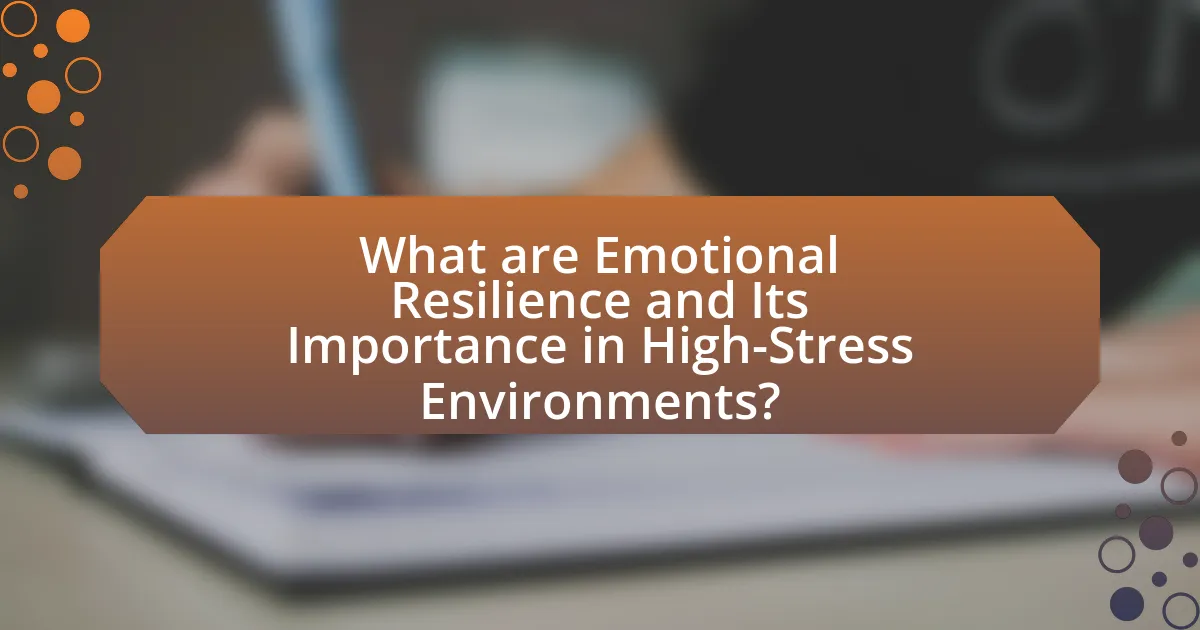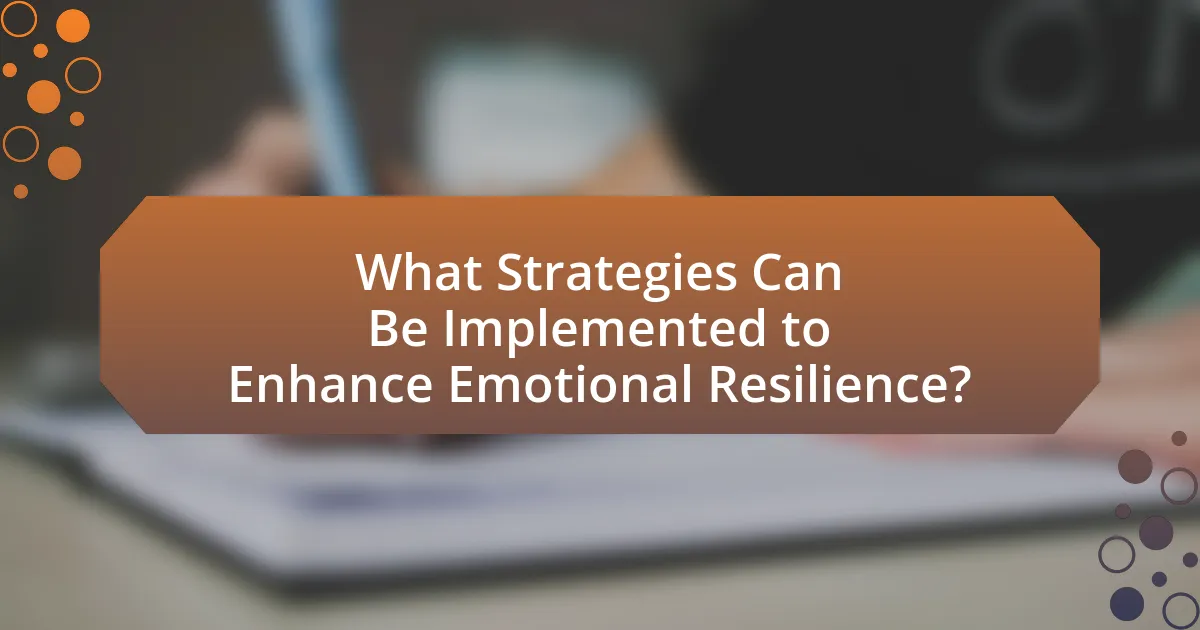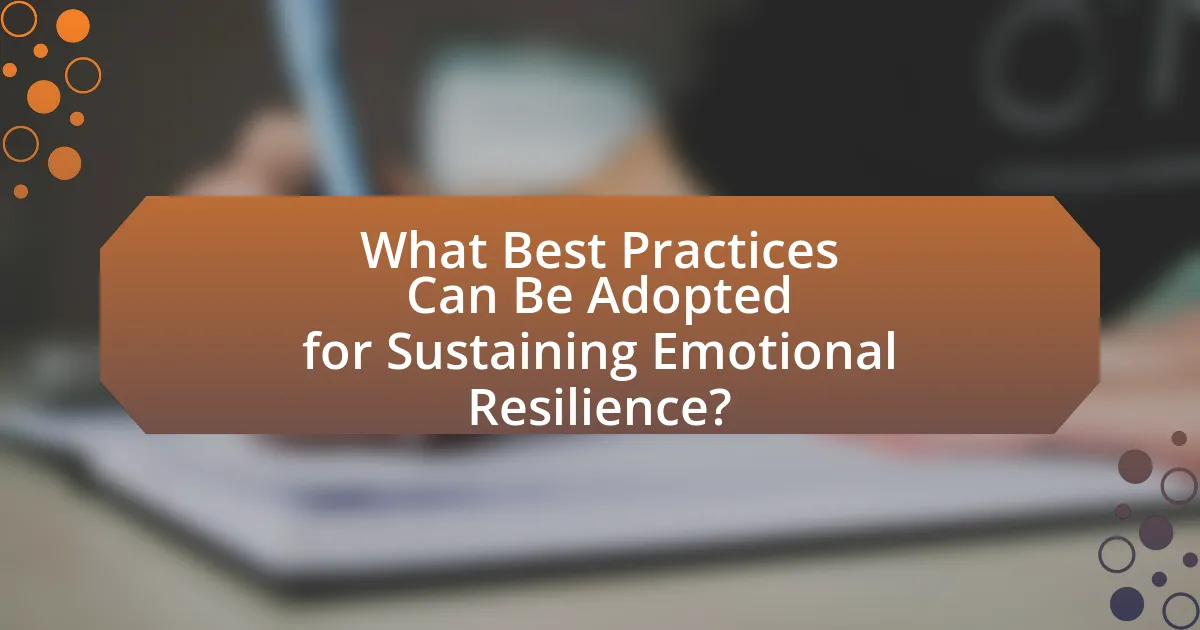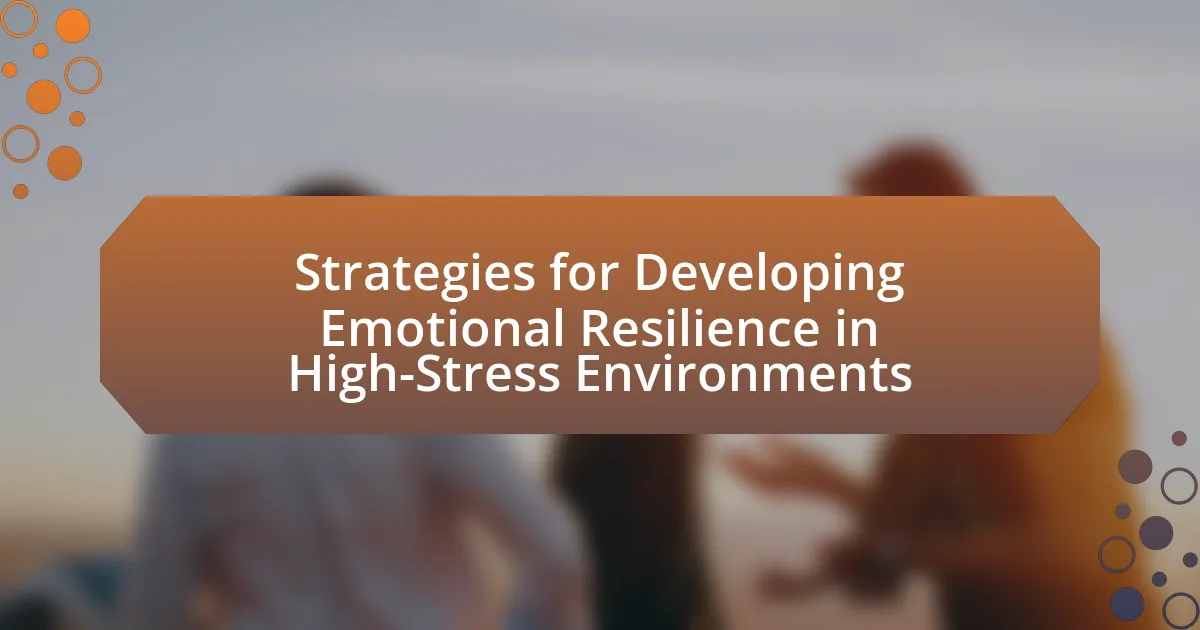Emotional resilience is defined as the ability to adapt to stressful situations and recover from adversity, playing a crucial role in maintaining mental well-being in high-stress environments. This article explores the importance of emotional resilience, its key characteristics, and the factors that influence its development, such as personal experiences and social support systems. It also examines the consequences of low emotional resilience on mental health and workplace performance, while providing strategies for individuals and organizations to enhance resilience through mindfulness, physical health, and effective coping mechanisms. Additionally, practical tips and resources for further development of emotional resilience are discussed, emphasizing the significance of continuous learning and support networks in fostering resilience.

What are Emotional Resilience and Its Importance in High-Stress Environments?
Emotional resilience is the ability to adapt to stressful situations and recover from adversity. In high-stress environments, emotional resilience is crucial as it enables individuals to maintain mental well-being, make sound decisions, and effectively manage challenges. Research indicates that emotionally resilient individuals experience lower levels of anxiety and depression, which enhances their performance and productivity in demanding situations. For instance, a study published in the Journal of Occupational Health Psychology found that employees with higher emotional resilience reported better job satisfaction and lower burnout rates. This underscores the importance of fostering emotional resilience to navigate the complexities of high-stress environments successfully.
How is Emotional Resilience Defined?
Emotional resilience is defined as the ability to adapt to stressful situations and bounce back from adversity. This capacity enables individuals to maintain emotional stability and effectively cope with challenges, thereby reducing the impact of stress on mental health. Research indicates that emotionally resilient individuals often possess strong problem-solving skills, a positive outlook, and the ability to regulate their emotions, which collectively contribute to their resilience in high-stress environments.
What are the key characteristics of emotionally resilient individuals?
Emotionally resilient individuals exhibit several key characteristics, including adaptability, optimism, emotional awareness, and strong problem-solving skills. Adaptability allows them to adjust to changing circumstances effectively, while optimism helps them maintain a positive outlook even in challenging situations. Emotional awareness enables them to understand and manage their emotions, facilitating better responses to stress. Strong problem-solving skills empower them to navigate obstacles and find constructive solutions. Research indicates that these traits contribute significantly to an individual’s ability to cope with stress and recover from adversity, as highlighted in studies on resilience psychology.
Why is emotional resilience crucial in high-stress situations?
Emotional resilience is crucial in high-stress situations because it enables individuals to effectively manage stress and recover from adversity. This capacity allows people to maintain focus, make sound decisions, and adapt to changing circumstances, which is essential in environments where pressure is high. Research indicates that emotionally resilient individuals experience lower levels of anxiety and depression, leading to improved performance and well-being under stress. For instance, a study published in the Journal of Occupational Health Psychology found that employees with higher emotional resilience reported better job satisfaction and lower burnout rates, highlighting the importance of this trait in maintaining productivity and mental health during challenging times.
What Factors Influence Emotional Resilience?
Emotional resilience is influenced by several key factors, including individual personality traits, social support systems, and coping strategies. Research indicates that traits such as optimism and self-efficacy enhance resilience by enabling individuals to view challenges as opportunities for growth. Additionally, strong social support networks provide emotional and practical assistance, which is crucial during stressful times. Effective coping strategies, such as problem-solving and mindfulness, further contribute to an individual’s ability to manage stress and recover from adversity. Studies have shown that individuals with these characteristics are better equipped to handle high-stress environments, demonstrating the importance of these factors in fostering emotional resilience.
How do personal experiences shape emotional resilience?
Personal experiences significantly shape emotional resilience by influencing how individuals respond to stress and adversity. These experiences, whether positive or negative, contribute to the development of coping strategies and emotional regulation skills. For instance, research indicates that individuals who have faced and overcome challenges often develop a stronger sense of self-efficacy and adaptability, which are key components of emotional resilience. A study published in the Journal of Personality and Social Psychology found that people who experienced supportive relationships during difficult times were more likely to develop resilience, highlighting the role of social support in personal experiences. Thus, the nature and context of personal experiences directly impact the ability to cope with stress and bounce back from setbacks.
What role do social support systems play in developing resilience?
Social support systems play a crucial role in developing resilience by providing emotional, informational, and practical assistance during challenging times. These systems, which include family, friends, and community networks, enhance an individual’s ability to cope with stress and adversity. Research indicates that individuals with strong social support are more likely to experience lower levels of anxiety and depression, as well as improved overall mental health. For instance, a study published in the Journal of Health and Social Behavior found that social support significantly mitigates the effects of stress on mental health, demonstrating its importance in fostering resilience.
What are the Consequences of Low Emotional Resilience?
Low emotional resilience leads to increased vulnerability to stress, anxiety, and depression. Individuals with low emotional resilience often struggle to cope with challenges, resulting in impaired decision-making and reduced problem-solving abilities. Research indicates that low emotional resilience can also contribute to physical health issues, such as cardiovascular problems, due to chronic stress responses. Furthermore, it can negatively impact relationships, as individuals may exhibit irritability or withdrawal, making it difficult to maintain social connections. These consequences highlight the importance of developing emotional resilience, particularly in high-stress environments, to mitigate adverse effects on mental and physical well-being.
How does low resilience affect mental health in high-stress environments?
Low resilience negatively impacts mental health in high-stress environments by increasing vulnerability to anxiety, depression, and burnout. Individuals with low resilience struggle to cope with stressors, leading to heightened emotional distress and impaired functioning. Research indicates that low resilience correlates with higher levels of psychological symptoms; for instance, a study published in the Journal of Occupational Health Psychology found that employees with low resilience reported significantly more stress-related issues compared to their resilient counterparts. This diminished capacity to manage stress can result in a cycle of poor mental health outcomes, further exacerbating the challenges faced in demanding situations.
What impact does low emotional resilience have on workplace performance?
Low emotional resilience negatively impacts workplace performance by reducing an individual’s ability to cope with stress and adversity. Employees with low emotional resilience often experience increased anxiety and burnout, leading to decreased productivity and higher absenteeism rates. Research indicates that organizations with resilient employees report 31% lower turnover rates and 37% higher job performance, highlighting the importance of emotional resilience in maintaining effective workplace dynamics.
How Can Individuals Develop Emotional Resilience?
Individuals can develop emotional resilience by practicing self-awareness, fostering a supportive social network, and engaging in stress management techniques. Self-awareness allows individuals to recognize their emotions and triggers, which is essential for managing responses to stress. Building a supportive social network provides emotional support and practical assistance during challenging times, enhancing coping mechanisms. Additionally, engaging in stress management techniques such as mindfulness, exercise, and cognitive restructuring has been shown to improve emotional regulation and resilience. Research indicates that individuals who regularly practice these strategies report lower levels of stress and higher emotional well-being, demonstrating the effectiveness of these approaches in developing emotional resilience.

What Strategies Can Be Implemented to Enhance Emotional Resilience?
To enhance emotional resilience, individuals can implement strategies such as practicing mindfulness, fostering social connections, and engaging in regular physical activity. Mindfulness techniques, including meditation and deep-breathing exercises, have been shown to reduce stress and improve emotional regulation, as evidenced by a study published in the journal “Psychological Science,” which found that mindfulness training significantly enhances emotional resilience. Building strong social networks provides support during challenging times, as research indicates that individuals with robust social ties experience lower levels of stress and better coping mechanisms. Additionally, regular physical activity is linked to improved mood and reduced anxiety, with the American Psychological Association noting that exercise can lead to significant improvements in emotional well-being.
What are Effective Coping Mechanisms for Stress Management?
Effective coping mechanisms for stress management include mindfulness meditation, physical exercise, and social support. Mindfulness meditation has been shown to reduce stress by promoting relaxation and enhancing emotional regulation, as evidenced by a study published in the journal “Psychosomatic Medicine,” which found that participants who practiced mindfulness reported lower stress levels. Physical exercise, such as aerobic activities, releases endorphins that improve mood and reduce anxiety, supported by research from the American Psychological Association indicating that regular physical activity can significantly lower stress. Additionally, social support from friends and family provides emotional comfort and practical assistance, which has been linked to better stress outcomes in numerous studies, including one published in “Health Psychology” that demonstrated the protective effects of social networks on stress resilience.
How can mindfulness practices contribute to emotional resilience?
Mindfulness practices contribute to emotional resilience by enhancing self-awareness and emotional regulation. These practices, such as meditation and focused breathing, allow individuals to observe their thoughts and feelings without judgment, leading to a greater understanding of their emotional responses. Research indicates that mindfulness can reduce stress and anxiety, which are significant barriers to emotional resilience. A study published in the journal “Psychological Science” by Keng, Smoski, and Robins (2011) found that mindfulness training significantly improved emotional regulation and decreased emotional reactivity. This evidence supports the assertion that mindfulness practices foster emotional resilience by equipping individuals with tools to manage stress effectively and maintain emotional balance in high-stress environments.
What role does physical health play in building resilience?
Physical health significantly contributes to building resilience by enhancing an individual’s ability to cope with stress and recover from adversity. Good physical health improves brain function, boosts mood through the release of endorphins, and strengthens the immune system, all of which are crucial for managing stress effectively. Research indicates that regular physical activity can reduce anxiety and depression, leading to improved emotional stability. For instance, a study published in the Journal of Clinical Psychiatry found that exercise can be as effective as medication for some individuals with depression, highlighting the direct link between physical health and emotional resilience.
How Can Positive Thinking and Self-Talk Improve Resilience?
Positive thinking and self-talk significantly enhance resilience by fostering a constructive mindset that enables individuals to cope with stress and adversity more effectively. Research indicates that individuals who engage in positive self-talk are better equipped to manage challenges, as it promotes a sense of control and optimism. For instance, a study published in the Journal of Personality and Social Psychology found that positive self-affirmations can lead to improved problem-solving abilities and reduced anxiety in high-pressure situations. This cognitive shift allows individuals to view setbacks as temporary and manageable, thereby reinforcing their resilience in the face of difficulties.
What techniques can be used to cultivate a positive mindset?
Techniques to cultivate a positive mindset include practicing gratitude, engaging in mindfulness meditation, and reframing negative thoughts. Practicing gratitude involves regularly acknowledging and appreciating positive aspects of life, which has been shown to enhance overall well-being and reduce stress. Mindfulness meditation helps individuals focus on the present moment, reducing anxiety and promoting a sense of calm. Reframing negative thoughts encourages individuals to view challenges as opportunities for growth, which can lead to improved emotional resilience. Research indicates that these techniques can significantly improve mental health outcomes, as evidenced by studies published in journals such as the Journal of Happiness Studies and the Journal of Positive Psychology.
How does self-talk influence emotional responses in stressful situations?
Self-talk significantly influences emotional responses in stressful situations by shaping an individual’s perception and interpretation of the stressor. Positive self-talk can enhance coping mechanisms, reduce anxiety, and promote a sense of control, while negative self-talk can exacerbate feelings of helplessness and fear. Research by Meichenbaum (1977) in “Cognitive Behavior Modification” demonstrates that individuals who engage in constructive self-talk during stress report lower levels of distress and improved performance outcomes. This indicates that the way individuals communicate with themselves can directly affect their emotional resilience and ability to manage stress effectively.
What Skills Can Be Developed to Foster Emotional Resilience?
Skills that can be developed to foster emotional resilience include emotional regulation, cognitive flexibility, problem-solving, and social support skills. Emotional regulation allows individuals to manage their emotions effectively, reducing stress and enhancing coping mechanisms. Cognitive flexibility enables individuals to adapt their thinking in response to changing circumstances, which is crucial in high-stress environments. Problem-solving skills empower individuals to identify solutions to challenges, promoting a proactive approach to stressors. Lastly, social support skills facilitate the building of strong relationships, providing a network of support during difficult times. Research indicates that these skills contribute significantly to an individual’s ability to withstand and recover from stress, as evidenced by studies showing that individuals with higher emotional regulation and social support report lower levels of stress and better overall mental health.
How can problem-solving skills enhance resilience in high-stress environments?
Problem-solving skills enhance resilience in high-stress environments by enabling individuals to effectively navigate challenges and reduce feelings of helplessness. When individuals possess strong problem-solving abilities, they can identify issues, generate potential solutions, and implement strategies to address stressors, which fosters a sense of control and agency. Research indicates that individuals who engage in problem-solving are better equipped to cope with stress, as they can break down overwhelming situations into manageable parts, thereby decreasing anxiety and promoting adaptive responses. For instance, a study published in the Journal of Occupational Health Psychology found that employees with higher problem-solving skills reported lower levels of stress and greater job satisfaction, demonstrating the direct link between these skills and resilience in demanding situations.
What communication skills are essential for building resilience?
Active listening, empathy, and assertiveness are essential communication skills for building resilience. Active listening allows individuals to fully understand and process information, fostering stronger relationships and support networks. Empathy enables individuals to connect with others’ feelings and experiences, which can enhance emotional support during challenging times. Assertiveness helps individuals express their needs and boundaries clearly, promoting self-advocacy and reducing stress. Research indicates that effective communication skills contribute to better coping strategies and emotional regulation, which are critical for resilience in high-stress environments.
How Can Organizations Support Emotional Resilience Among Employees?
Organizations can support emotional resilience among employees by implementing comprehensive mental health programs and fostering a supportive workplace culture. Research indicates that workplaces that prioritize mental health initiatives, such as Employee Assistance Programs (EAPs) and resilience training, significantly enhance employees’ coping mechanisms and overall well-being. For instance, a study published in the Journal of Occupational Health Psychology found that employees who participated in resilience training reported a 25% increase in their ability to manage stress effectively. Additionally, promoting open communication and providing access to mental health resources can create an environment where employees feel safe to express their challenges, further strengthening their emotional resilience.

What Best Practices Can Be Adopted for Sustaining Emotional Resilience?
Best practices for sustaining emotional resilience include practicing mindfulness, maintaining strong social connections, and engaging in regular physical activity. Mindfulness techniques, such as meditation and deep-breathing exercises, have been shown to reduce stress and enhance emotional regulation, as evidenced by a study published in the journal “Psychological Science,” which found that mindfulness can improve emotional well-being. Strong social connections provide support and a sense of belonging, which are critical for resilience; research from the American Psychological Association indicates that individuals with robust social networks experience lower levels of stress and better mental health outcomes. Regular physical activity is also essential, as it releases endorphins that improve mood and reduce anxiety, supported by findings from the Mayo Clinic that highlight the mental health benefits of exercise.
What are Daily Habits that Promote Emotional Resilience?
Daily habits that promote emotional resilience include practicing mindfulness, engaging in regular physical activity, maintaining a balanced diet, fostering social connections, and setting realistic goals. Mindfulness practices, such as meditation, have been shown to reduce stress and enhance emotional regulation, as evidenced by a study published in the journal Psychological Science, which found that mindfulness can improve emotional well-being. Regular physical activity releases endorphins, which are known to improve mood and reduce anxiety, supported by research from the American Psychological Association indicating that exercise can significantly enhance mental health. A balanced diet rich in nutrients supports brain function and emotional stability, as highlighted by studies linking nutrition to mental health outcomes. Social connections provide emotional support and a sense of belonging, which are crucial for resilience, as demonstrated in research published in the Journal of Health and Social Behavior. Lastly, setting realistic goals fosters a sense of achievement and purpose, contributing to overall emotional strength.
How can regular reflection and self-assessment aid resilience development?
Regular reflection and self-assessment significantly enhance resilience development by fostering self-awareness and adaptive coping strategies. Engaging in these practices allows individuals to identify their emotional responses and thought patterns during stressful situations, which is crucial for understanding personal triggers and strengths. Research indicates that self-reflection can lead to improved emotional regulation, as individuals learn to manage their reactions more effectively (Schoenfeld et al., 2019, Journal of Applied Psychology). Furthermore, self-assessment encourages goal setting and progress tracking, which reinforces a sense of agency and control, essential components of resilience. By regularly evaluating their experiences, individuals can adapt their strategies, leading to greater resilience in high-stress environments.
What role does continuous learning play in maintaining resilience?
Continuous learning is essential for maintaining resilience as it equips individuals with the skills and knowledge necessary to adapt to changing circumstances. By engaging in continuous learning, individuals can develop problem-solving abilities, enhance emotional intelligence, and improve coping strategies, which are critical in high-stress environments. Research indicates that lifelong learning fosters a growth mindset, enabling individuals to view challenges as opportunities for development rather than insurmountable obstacles. This adaptability is supported by studies showing that individuals who actively seek new knowledge and experiences are better able to manage stress and recover from setbacks, thereby reinforcing their resilience.
What Resources are Available for Further Development of Emotional Resilience?
Resources available for further development of emotional resilience include psychological training programs, self-help books, online courses, and support groups. Psychological training programs, such as those offered by the American Psychological Association, provide evidence-based strategies for managing stress and enhancing emotional regulation. Self-help books like “The Resilience Factor” by Karen Reivich and Andrew Shatté offer practical exercises and insights into building resilience. Online platforms, such as Coursera and Udemy, feature courses focused on emotional intelligence and resilience-building techniques. Additionally, support groups, both in-person and virtual, provide community and shared experiences that foster resilience through collective coping strategies.
How can workshops and training programs enhance resilience skills?
Workshops and training programs enhance resilience skills by providing structured environments for individuals to learn coping strategies and stress management techniques. These programs often incorporate evidence-based practices, such as cognitive-behavioral techniques, which have been shown to improve emotional regulation and adaptability in high-stress situations. For instance, a study published in the Journal of Occupational Health Psychology found that participants in resilience training reported a 30% increase in their ability to manage stress effectively. By engaging in role-playing scenarios and group discussions, individuals can practice these skills in a supportive setting, leading to improved confidence and a greater sense of control over their responses to stressors.
What literature and tools are recommended for building emotional resilience?
Recommended literature for building emotional resilience includes “The Resilience Factor” by Karen Reivich and Andrew Shatté, which provides practical strategies for enhancing resilience through cognitive-behavioral techniques. Additionally, “Option B” by Sheryl Sandberg and Adam Grant discusses overcoming adversity and building resilience through personal stories and research. Tools for developing emotional resilience encompass mindfulness practices, such as meditation apps like Headspace and Calm, which help individuals manage stress and enhance emotional regulation. Furthermore, cognitive-behavioral therapy (CBT) techniques, often found in self-help workbooks, can effectively foster resilience by changing negative thought patterns.
What Practical Tips Can Help Individuals Build Emotional Resilience?
Practical tips for building emotional resilience include practicing mindfulness, developing a strong support network, and maintaining a healthy lifestyle. Mindfulness techniques, such as meditation and deep-breathing exercises, help individuals manage stress and enhance emotional regulation. Research indicates that mindfulness can reduce anxiety and improve overall well-being (Kabat-Zinn, 1990). A strong support network provides emotional and practical assistance, which is crucial during challenging times; studies show that social support is linked to better mental health outcomes (Cohen & Wills, 1985). Additionally, engaging in regular physical activity and maintaining a balanced diet contribute to emotional stability, as exercise releases endorphins that improve mood and cognitive function (Ratey, 2008).
